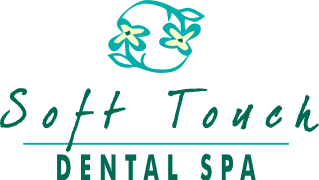
A dentist or a dental hygienist can take a quick look inside your mouth and tell you whether you clench and grind your teeth in your sleep. We often find that patients are skeptical that we can glean this information from just a brief examination, but our diagnoses is much less like palm reading or interpreting tea leaves than it may seem. Here’s what we’re seeing when we look in your mouth:
Tooth Damage
Bruxism is the medical term for clenching and grinding your teeth, and it can leave visible signs on your teeth. The repetitive stress of the grinding motion can cause teeth to get worn down, starting with the hard outer enamel layer and getting down to the softer dentin layer as the damage progresses. People who have been grinding for a long time usually have teeth that are shorter with a flattened appearance along the edges, as if the teeth have all been trimmed to be the same length. Severe cases of bruxism can even lead to cracked or broken teeth, especially in people who have already had teeth repaired with a crown.
Headaches
Tension headaches can be caused by bruxism. All the pressure from the constantly tight jaw can build up and cause pain. Patients who report waking up with headaches on a regular basis may clench and grind in their sleep. Using a nightguard each night might reduce or eliminate these headaches completely.
Jaw Problems
Recent studies have shown a correlation between bruxism and TMD, which is a disorder of the jaw that causes pain and other problems. The temporomandibular joint is your main jaw joint, and there is some evidence that the strain caused by clenching and grinding can contribute to joint problems. Those with bruxism can cause enlargement of the masseter muscle, which helps operate the movement of the lower jaw. Constant clenching and grinding “works out” this muscle, causing it to bulk up, contributing to a square-jawed appearance.
Bony Protrusions
Believe it or not, clenching and grinding can actually change the shape of your bone. Though not particularly common, some people with bruxism develop bony growths on the inside of their lower jaw, under the tongue. These growths are called mandibular tori, and they are harmless and benign. However, their presence can indicate to the dentist that you clench and grind, even if you don’t have any of the other signs and symptoms mentioned above.
Invisalign® Clear Braces
Invisalign® is the revolutionary way to help you get even, straight teeth without noticeable, painful metal braces.
Digital X-Rays Are Safer
Digital x-rays are computer-generated images that require up to 90% less radiation than conventional film-type x-rays.
Reshape & Whiten Your Smile With Veneers
Fix discolored, chipped or crooked teeth quickly & easily with natural-looking veneers.
Ready to Book Your Appointment?
At Soft Touch Dental Spa, we have convenient hours that won’t make you miss work or school.
Address & Phone
Hours
- Monday: 10:30am–7pm
- Tuesday: 9am–7pm
- Wednesday: 9am–7pm
- Thursday: 9am–7pm
- Friday: 9am–5pm
- Saturday: 8am–2pm
- Sunday: CLOSED
About Us
Soft Touch Dental Spa is proud of the warm & attentive dental care we provide our patients. Using the latest procedures & technologies, we provide comfortable, health-centered dentistry. We enjoy becoming acquainted with your individual needs & we take pride in always explaining the treatment options available to you.
